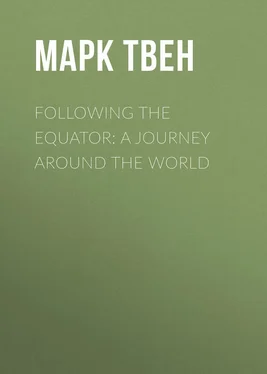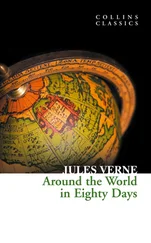Марк Твен - Following the Equator - A Journey Around the World
Здесь есть возможность читать онлайн «Марк Твен - Following the Equator - A Journey Around the World» — ознакомительный отрывок электронной книги совершенно бесплатно, а после прочтения отрывка купить полную версию. В некоторых случаях можно слушать аудио, скачать через торрент в формате fb2 и присутствует краткое содержание. Жанр: foreign_antique, foreign_prose, Путешествия и география, на английском языке. Описание произведения, (предисловие) а так же отзывы посетителей доступны на портале библиотеки ЛибКат.
- Название:Following the Equator: A Journey Around the World
- Автор:
- Жанр:
- Год:неизвестен
- ISBN:нет данных
- Рейтинг книги:4 / 5. Голосов: 1
-
Избранное:Добавить в избранное
- Отзывы:
-
Ваша оценка:
- 80
- 1
- 2
- 3
- 4
- 5
Following the Equator: A Journey Around the World: краткое содержание, описание и аннотация
Предлагаем к чтению аннотацию, описание, краткое содержание или предисловие (зависит от того, что написал сам автор книги «Following the Equator: A Journey Around the World»). Если вы не нашли необходимую информацию о книге — напишите в комментариях, мы постараемся отыскать её.
Following the Equator: A Journey Around the World — читать онлайн ознакомительный отрывок
Ниже представлен текст книги, разбитый по страницам. Система сохранения места последней прочитанной страницы, позволяет с удобством читать онлайн бесплатно книгу «Following the Equator: A Journey Around the World», без необходимости каждый раз заново искать на чём Вы остановились. Поставьте закладку, и сможете в любой момент перейти на страницу, на которой закончили чтение.
Интервал:
Закладка:
But the explanation was simple. Years ago the fabulously rich silver discovery at Broken Hill burst suddenly upon an unexpectant world. Its stocks started at shillings, and went by leaps and bounds to the most fanciful figures. It was one of those cases where the cook puts a month’s wages into shares, and comes next month and buys your house at your own price, and moves into it herself; where the coachman takes a few shares, and next month sets up a bank; and where the common sailor invests the price of a spree, and the next month buys out the steamship company and goes into business on his own hook. In a word, it was one of those excitements which bring multitudes of people to a common center with a rush, and whose needs must be supplied, and at once. Adelaide was close by, Sydney was far away. Adelaide threw a short railway across the border before Sydney had time to arrange for a long one; it was not worth while for Sydney to arrange at all. The whole vast trade-profit of Broken Hill fell into Adelaide’s hands, irrevocably. New South Wales law furnishes for Broken Hill and sends her Judges 2,000 miles – mainly through alien countries – to administer it, but Adelaide takes the dividends and makes no moan.
We started at 4.20 in the afternoon, and moved across level plains until night. In the morning we had a stretch of “scrub” country – the kind of thing which is so useful to the Australian novelist. In the scrub the hostile aboriginal lurks, and flits mysteriously about, slipping out from time to time to surprise and slaughter the settler; then slipping back again, and leaving no track that the white man can follow. In the scrub the novelist’s heroine gets lost, search fails of result; she wanders here and there, and finally sinks down exhausted and unconscious, and the searchers pass within a yard or two of her, not suspecting that she is near, and by and by some rambler finds her bones and the pathetic diary which she had scribbled with her failing hand and left behind. Nobody can find a lost heroine in the scrub but the aboriginal “tracker,” and he will not lend himself to the scheme if it will interfere with the novelist’s plot. The scrub stretches miles and miles in all directions, and looks like a level roof of bush-tops without a break or a crack in it – as seamless as a blanket, to all appearance. One might as well walk under water and hope to guess out a route and stick to it, I should think. Yet it is claimed that the aboriginal “tracker” was able to hunt out people lost in the scrub. Also in the “bush”; also in the desert; and even follow them over patches of bare rocks and over alluvial ground which had to all appearance been washed clear of footprints.
From reading Australian books and talking with the people, I became convinced that the aboriginal tracker’s performances evince a craft, a penetration, a luminous sagacity, and a minuteness and accuracy of observation in the matter of detective-work not found in nearly so remarkable a degree in any other people, white or colored. In an official account of the blacks of Australia published by the government of Victoria, one reads that the aboriginal not only notices the faint marks left on the bark of a tree by the claws of a climbing opossum, but knows in some way or other whether the marks were made to-day or yesterday.
And there is the case, on record where A., a settler, makes a bet with B., that B. may lose a cow as effectually as he can, and A. will produce an aboriginal who will find her. B. selects a cow and lets the tracker see the cow’s footprint, then be put under guard. B. then drives the cow a few miles over a course which drifts in all directions, and frequently doubles back upon itself; and he selects difficult ground all the time, and once or twice even drives the cow through herds of other cows, and mingles her tracks in the wide confusion of theirs. He finally brings his cow home; the aboriginal is set at liberty, and at once moves around in a great circle, examining all cow-tracks until he finds the one he is after; then sets off and follows it throughout its erratic course, and ultimately tracks it to the stable where B. has hidden the cow. Now wherein does one cow-track differ from another? There must be a difference, or the tracker could not have performed the feat; a difference minute, shadowy, and not detectible by you or me, or by the late Sherlock Holmes, and yet discernible by a member of a race charged by some people with occupying the bottom place in the gradations of human intelligence.
CHAPTER XVIII
It is easier to stay out than get out.
– Pudd’nhead Wilson’s New Calendar.
The train was now exploring a beautiful hill country, and went twisting in and out through lovely little green valleys. There were several varieties of gum trees; among them many giants. Some of them were bodied and barked like the sycamore; some were of fantastic aspect, and reminded one of the quaint apple trees in Japanese pictures. And there was one peculiarly beautiful tree whose name and breed I did not know. The foliage seemed to consist of big bunches of pine-spines, the lower half of each bunch a rich brown or old-gold color, the upper half a most vivid and strenuous and shouting green. The effect was altogether bewitching. The tree was apparently rare. I should say that the first and last samples of it seen by us were not more than half an hour apart. There was another tree of striking aspect, a kind of pine, we were told. Its foliage was as fine as hair, apparently, and its mass sphered itself above the naked straight stem like an explosion of misty smoke. It was not a sociable sort; it did not gather in groups or couples, but each individual stood far away from its nearest neighbor. It scattered itself in this spacious and exclusive fashion about the slopes of swelling grassy great knolls, and stood in the full flood of the wonderful sunshine; and as far as you could see the tree itself you could also see the ink-black blot of its shadow on the shining green carpet at its feet.
On some part of this railway journey we saw gorse and broom – importations from England – and a gentleman who came into our compartment on a visit tried to tell me which – was which; but as he didn’t know, he had difficulty. He said he was ashamed of his ignorance, but that he had never been confronted with the question before during the fifty years and more that he had spent in Australia, and so he had never happened to get interested in the matter. But there was no need to be ashamed. The most of us have his defect. We take a natural interest in novelties, but it is against nature to take an interest in familiar things. The gorse and the broom were a fine accent in the landscape. Here and there they burst out in sudden conflagrations of vivid yellow against a background of sober or sombre color, with a so startling effect as to make a body catch his breath with the happy surprise of it. And then there was the wattle, a native bush or tree, an inspiring cloud of sumptuous yellow bloom. It is a favorite with the Australians, and has a fine fragrance, a quality usually wanting in Australian blossoms.
The gentleman who enriched me with the poverty of his information about the gorse and the broom told me that he came out from England a youth of twenty and entered the Province of South Australia with thirty-six shillings in his pocket – an adventurer without trade, profession, or friends, but with a clearly-defined purpose in his head: he would stay until he was worth L200, then go back home. He would allow himself five years for the accumulation of this fortune.
“That was more than fifty years ago,” said he. “And here I am, yet.”
As he went out at the door he met a friend, and turned and introduced him to me, and the friend and I had a talk and a smoke. I spoke of the previous conversation and said there was something very pathetic about this half century of exile, and that I wished the L200 scheme had succeeded.
Читать дальшеИнтервал:
Закладка:
Похожие книги на «Following the Equator: A Journey Around the World»
Представляем Вашему вниманию похожие книги на «Following the Equator: A Journey Around the World» списком для выбора. Мы отобрали схожую по названию и смыслу литературу в надежде предоставить читателям больше вариантов отыскать новые, интересные, ещё непрочитанные произведения.
Обсуждение, отзывы о книге «Following the Equator: A Journey Around the World» и просто собственные мнения читателей. Оставьте ваши комментарии, напишите, что Вы думаете о произведении, его смысле или главных героях. Укажите что конкретно понравилось, а что нет, и почему Вы так считаете.












